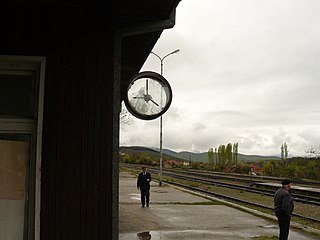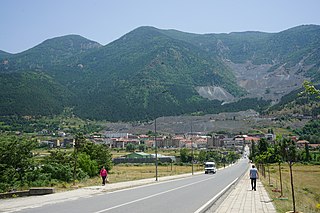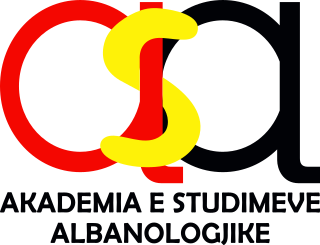Related Research Articles

Zajas is a village in the municipality of Kičevo, North Macedonia. Zajas was the seat of the Zajas Municipality, and is now in Kičevo Municipality.

Mali i Lopës is a mountain located in east-central Albania, on the border between Dibër and Mat municipalities. Its highest peak, Maja e Dhoksit, reaches a height of 2,012 m (6,601 ft). It is surrounded by the valleys of Zalli i Bulqizës to the north, Zalli i Okshtunit to the east, Kaptina e Martaneshit to the south, and the upper valley of Mat to the west.

The Battle of Polog was the result of an Albanian incursion into Ottoman territory. Aided by Alfonso the Magnanimous, the Albanian leader Skanderbeg made plans to recapture Svetigrad, which had been lost in 1448. His strategy involved launching an invasion of Macedonia to devastate the country surrounding Svetigrad and to lure the garrison into a trap. While implementing this, he was stopped in the fields of Polog near Tetovo by a force which was planning to invade Albania led by his old friend Ibrahim Pasha. The force was quickly destroyed and Skanderbeg's army proceeded its looting before returning to Debar.
Nikollë Bardhi (1551–1617) was an Albanian prelate of the Roman Catholic Church. He played a key role in the Albanian struggle against the Ottoman Empire.
Alush bey Frakulla was an Albanian leader, known for his role in the uprisings of 1835 and 1837. During the latter, he was captured together with 150 of his men and was punished with hard labor in Ottoman prisons, where he died in unknown date.

Sotir Kolea (1872-1945) was an Albanian folklorist, diplomat and activist of the Albanian National Awakening. Along with Thoma Kacori he has been labeled as the Last of the Rilindas.

Aqif Pasha Biçaku mostly known as Aqif Pashë Elbasani was an Ottoman Albanian political figure in the Sanjak of Elbasan and after the Young Turk Revolution became an activist for the Albanian national cause.
Lambros Tzavelas was a Souliot leader. Lambros Tzavelas was famous for his role in the Souliot struggles against Ali Pasha, the Pasha of Yanina. Tzavelas was born in Souli.

The Academy of Albanological Studies (AAS) is the main institution of albanology in Albania.
Niko Qafzezi was an agronomist and pedagogue from Albania.
Marenglen Verli is an Albanian historian and scholar. Since 2009, he is a member of the Academy of Sciences of Albania.
The Convention of Mat was organized on 7 November 1594 by Albanian leaders fighting against the Ottoman Empire. Mat was chosen as the place of the meeting due to its role in Albanian revolts of the 16th century. The aim was a better organization of the revolts to achieve independence from the Ottoman Empire. The convention decided that help should be sought from the Pope, and for negotiations were chosen Tom Plezha, Mark Gjini and Nikollë Mekajshi. However, the Pope refused to give help, claiming that it was not the right time to fight the Ottoman Empire. Another decision of Albanian leaders was to not let the Republic of Venice know about their plans as the latter did not want to open a new conflict with the Ottomans. The news came out and Venetians managed to divide the organizers of the convention between themselves. In the following two years, Albanian leaders continued their work to get help from Christian powers, taking heart from geopolitical circumstances. In 1596, 10,000 men marched towards Vlora in hope of receiving arms from Spain but the arms sent were confiscated by Venetians. The events damaged the relations between Albanian leaders and Christian powers but did not weaken the efforts for independence.
The Convention of Dibra was organized on November 1, 1878, in the city of Dibra, on the initiative of the Committee of the Albanian League for the two Dibras chaired by Iljaz Pasha Dibra. The convention adopted a resolution in the form of a memorandum, drafted by Abdyl Frashëri who participated as representative of the whole of Vilayet of Ioannina.
Andrea Manesi was an Albanian leader who organized a revolt in 1607 against the Ottoman Empire. He declared himself to be the second Skanderbeg, instructed by celestial beings to depose the Sultan and take his place. Gaining fame as having miraculous abilities and helping the poor, he increased the number of his supporters until the revolt was put to an end by Ottoman armies.
Tom Plezha was an Albanian leader chosen at the Convention of Mat to negotiate with the Pope an alliance against the Ottoman Empire.
The Convention of Kuçi was an interregional assembly held on July 14–15, 1614, in the area of the Kuçi tribe in the region of Malësia in modern northernmost Albania and Montenegro. A second assembly was held on September 8, 1614, which reaffirmed the decisions of the July assembly and also had an enlarged participation. Of the 44 representatives of the first assembly, almost all were from the Albanian tribes and the tribes of Montenegro. Several representatives of tribes are mentioned in the reports of the decisions of the assembly like Gjergj Bardhi from Mirdita and Gjin Gjergji from Dukagjin.
Spinarica or Spinarizza was a medieval city on the mouth of Vjosa river in southern Albania. It was an important center of trade, a status boosted by its strategic location. During its existence the city was ruled by the Byzantines, Venetians, Angevins, the Hohenstaufen dynasty and finally by the Ottomans. The exact reasons for Spinarica's decline are not known, though at the same period several important cities throughout Albania were abandoned due to socioeconomic issues caused by the Ottomans. The once prosperous city has been located by some scholars in the area of today's Zvërnec north of Vlorë.
The Battle of Përmet or Battle of Kuqarit was a battle of the Albanian Resistance of World War II against the Italian Fascists. The battle took place in 1943 near Kuqari.
The Reçi War, was the toughest and most successful resistance against the Italian fascists in the Shkodra region. This war took place in World War II in Albania, 1943 and was the last Albanian war against the Italian invaders.
Shufada was a medieval trade port in northern Albania. It was near the mouth of a river, with academics proposing Mat, Ishëm and Erzen. It was at the time one among a string of ports in Albania that enjoyed prosperity and economic significance until being abandoned at the start of the Ottoman period. A 1420 commercial treaty between Gjon Kastrioti and the Republic of Ragusa shows that Shufada was the main customs port for the former's domains.
References
- ↑ Malcolm, Noel (2015). Agents of Empire: Knights, Corsairs, Jesuits and Spies in the Sixteenth-century Mediterranean World. Oxford University Press. p. 409. ISBN 9780190262785.
- ↑ Instituti i Historisë (1967). Studime historike. Akademia e Shkencave. p. 123.
- 1 2 Aleks Buda (1985). Fjalor enciklopedik shqiptar. Akademia e Shkencave e RPSSH. p. 585.
- 1 2 3 Jehona. 1969. p. 83.
- ↑ Islami, Selim (1988). Gjurmime albanologjike: Seria e shkencave historike. Instituti. p. 108.